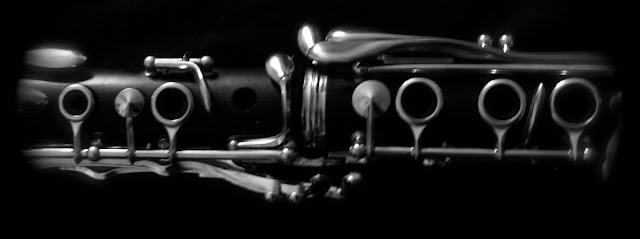V: There are ways of telling whether she is a witch.
P1: Are there? Well then tell us!
V: Tell me... what do you do with witches?
P3: Burn 'em! Burn them up! (burn burn burn)
V: What do you burn apart from witches?
P1: More witches!
P3: Wood! .....
V: Does wood sink in water?
P1: No
P3: No. It floats!...
V: What also floats in water?...
King: A Duck! (all look and stare at king)
V: Exactly! So, logically...
P1: If she weighs the same as a duck... she's made of wood!
V: And therefore,
(pause & think)
P3: A witch!
Jones, T,. Gilliam, T., (1975) (Directors) Monty Python and the Holy Grail, [Film] Python (Monty) Pictures.
BUT. What if the wood doesn't float?
 |
| Photo Credit: Yamaha.com How the clarinet is made. |
Theoretically (of course, I wouldn't want to put my whole clarinet in the water because it would ruin the pads!) if I put my clarinet in a tub of water, it would sink to the bottom. That's because it is made of the densest of woods, Grenadilla!
The Padawans often mistake my beautiful Bennie for being made of Ebony wood, and that's a common misunderstanding. Ebony, however, is actually darker than Grenadilla wood and from a different family. Grenadilla is more closely related to Rosewood, and indeed there are lighter-colored clarinets made of Rosewood.
Grenadilla is one of the densest of woods, which allows for the sonorous tones and stability between dry and humid conditions. It is so dense, in fact, that harvesting and shaping the wood requires tools that are more common for cutting metal than wood. It also has a high oil content that will further protect the wood.
I remember my first clarinet, a hard rubber Bundy student model. In 6th grade, I chose clarinet simply because I liked the look of the silver keys on black. I suppose in retrospect, that's not the worst reason to choose an instrument! Mine was given as a spec instrument to my high school band director, tried by the whole section and purchased by me (and my parents) as a graduation gift. I totally fell in love with the sound it made! It's been my constant and faithful companion through good times and bad.
One of the characteristics of a clarinet is that it has such a wide range of timbres. I find switching out mouthpieces and reeds has the biggest impact on the sound, but my favorite is a dark, rich and resonant sound that can only be attributed to the type of wood from which it is made.
So, back to the illustration of witches and wood. Keep in mind, my clarinet is named "Bennie" after Benny Goodman and therefore, a "he". I find a different script:
ME: There are ways of telling whether he makes magic.
P1: Are there? Well then tell us!
ME: Tell me... what happens when you create magic?
P3: The people watch in awe and wonder. (wonder!)
ME: What kinds of things make magic, apart from witches?
P1: More witches!
P3: Wood! .....
ME: Does wood sink in water?
P1: No
P3: No. It floats!...
ME: Actually, magic wood sinks!
King: A Duck! (all look and stare at king)
ME: (Stare at the king) Apologies, m'lord, allow me to create some magic on my beautiful tube of black wood. (Begins playing a low-pitched, slow and sonorous tune on the clarinet. The melody rises up into the higher ranges of the clarinet, speeding up and causing the hearts of the listeners to gasp in amazement and wonder. The crowd then begins dancing as the melody turns to Dixieland style second-line festivities style)
P3: A witch!
ME: Nope, just a pretty tube of black wood with good engineering and a lot of practice!



